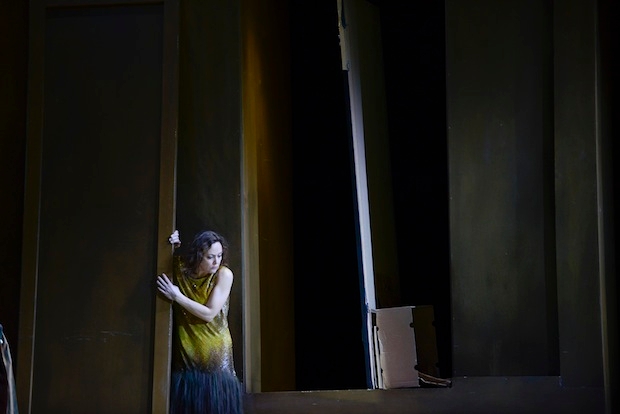Yet more performances of Elektra, Richard Strauss’s setting of Hugo von Hofmannsthal’s ramped-up, neurosis-riddled 1903 reworking of Sophocles, are unlikely to force any anniversary-year reassessments of the composer. But the piece’s current ubiquity does reflect the fact that we’re now relatively well off for singers equipped to tackle the fearsome title role.
At their head, arguably, stands the German soprano Evelyn Herlitzius. She’s yet to make her Covent Garden debut, inexplicably, but her riveting performance galvanised the opening night of the first high-profile new production of the work in 2014, at Dresden’s Semperoper, where it shocked and awed its first audience 105 years ago. Re-opened in 1985, the reconstructed theatre boasts a glorious acoustic and one of Germany’s classiest old orchestras, the Staatskapelle, with Christian Thielemann, in charge.
More or less concurrently, Peter Konwitschny’s 2005 production, first seen in Copenhagen, was being revived down the road in Leipzig. And while that city’s 1950s opera house can’t match Dresden’s for historic aura, it’s appealingly airy and business-like and features the no less wonderful Gewandhaus Orchestra in its pit. This quirk of programming made it possible to see two Elektras on two consecutive days: not the cheeriest way of spending a January weekend, perhaps, but instructive nonetheless.
Dresden assembled a luxurious all-German array of principals around Herlitzius. René Pape was an implacable, richly sung Orest; Anne Schwanewilms’s Chrysothemis was bright and brittle, but infuriatingly blank. Waltraud Meier was characteristically authoritative, but underplayed Klytämnestra. The other roles were strongly taken.
The director, Barbara Frey, was something of an odd one out in being Swiss, and a relative newcomer to opera. But none of that explained how she could have had quite so little to say about the piece. The single set (designed by Muriel Gerstner) presented a grand, wood-panelled room, half-built and apparently alluding, according to clued-up local critics, to Berlin’s Tempelhof Airport, opened in the 1920s but expanded by the Nazis. It looked more like a courtroom to me, especially with ‘Justitia fundamentum regnorum’ emblazoned across its top.
In a somewhat opaque programme note, Frey and her dramaturg, Micaela von Marcard, mused vaguely on similarities between the guilt-wracked German fathers who survived the second world war and Agamemnon, his own offspring children of conflict. They cited post-traumatic stress disorder and explored the psychological causes of Elektra’s inability to exact her longed-for revenge. But the production reflected none of this, communicating instead an austere, uninvolving dourness.
The symbol of Elektra’s failure, the axe she forgets to give to Orest, was absent, as was any hint of her murdered father, so musically present right from the opera’s arresting opening. There were a couple of striking effects in the lighting (by Gérard Cleven), and two cutesy children — the young Elektra and Orest, presumably — were wheeled out unnecessarily in the Recognition Scene. That seemed to be the sum of Frey’s interpretation.
Happily, it did little to hamper Herlitzius’s utterly compelling, wide-eyed and frenzied Elektra. Hers was an astonishing performance, the big voice thrilling and tireless, often teetering excitingly on the edge of unwieldiness but also capable of melting lyricism. The other principals, poorly defined in Bettina Walter’s nondescript mid-century costumes, came off less well. But the orchestra was magnificent, and Thielemann conducted with impeccable pacing, balancing the extremes of violence and tenderness that define the score. His achievement, and that of Herlitzius, emphasised how Frey’s production ultimately offered nothing.
There was impressive conducting in Leipzig from Ulf Schirmer, too, matched by some powerful and refined work from the Gewandhaus Orchestra. And here Konwitschny’s modern-dress staging overflowed with ideas. Some were good, some, at the more deliberately provocative end of the spectrum, less so. The axe was omnipresent, only to be abandoned in favour of a clinical pistol; Agamemnon, whose bloody death we witnessed as a pre-show vignette, remained in his bath onstage throughout, at one point getting out and lighting a cigarette. The endless parade of extras in the final ten minutes, tumbling over dead to the tinny sound of piped machine-gun fire, verged on the comic, perhaps deliberately so.
The family dynamic was turned on its head, too, with Karin Lovelius’s sensible Klytämnestra doing her best with her difficult offspring: a juvenile tomboy Elektra (Barbara Schneider-Hofstetter, a brave late replacement) and a needy Chrysothemis (the excellent Gun-Brit Barkmin), who cultivated a stylised femininity faintly reminiscent of Grayson Perry’s alter-ego, Claire. Much of it was baffling, if not irritating, and some of the message and conviction have got lost over the years, I’m sure, but this production still put Frey’s Dresden effort to shame.
Hugo Shirley is deputy editor of Opera magazine and a research fellow at Oxford Brookes University.








Comments